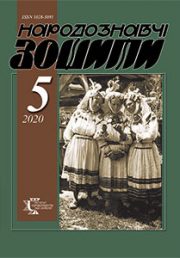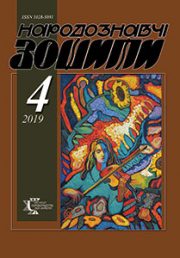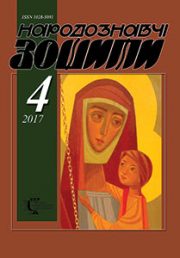The Ethnology Notebooks. 2024. № 4 (178), 823—834
UDK 821.161.2-97:801.81(477.85)
DOI https://doi.org/10.15407/nz2024.04.823
THE ISSUE OF MODERN EXISTENCE AND FUNCTIONING OF THE UKRAINIAN FOLK PRAYER IN BUKOVYNA
KOSTYK Vasyl
- ORCID ID: https://orcid.org/0000-0003-3177-1919
- Researcher ID: E-22.69-2016
- c. of philol. s., Associate
- Professor of the Department of Ukrainian Literature,
- Y. Fedkovych Chernivtsi National University,
- 2, Kotsiybinskogo Avenue, 58012, Chernivtsi, Ukraine,
- Contacts: e-mail:kostyk_vv@ukr.net
Abstract. Prayer is one of the most ancient genres of humanities, which arose based on the original magic spells and conspiracies. Over time, prayer became Christianized and lost its ancient form, diversifying in content. However, if the genre of the Ukrainian literary prayer has been largely developed and even a collection of them has been published (See: «Holy Feelings Embedded in Prayer»: Anthology of Ukrainian Literary Prayer. Compiled in 2004), then it really remains explored not enough in the Ukrainian folklore. Although we find a certain understanding and scientific justification already in the works of the 19th—20th centuries, there are also samples of theoretical generalization in the works of researchers in the early 21st century. For example, the texts of Ukrainian folk prayers, spells, humorous sayings, and curses became the object of research in I. Hunchyk’s research (dissertation) «Ukrainian Occasional and Ritual Folklore: Structural and Functional Aspect» (Lviv, 2005). The topic of research is extremely relevant in this context.
The objective of the work is to study the history of the collection and existence of texts of Ukrainian prayers, as well as their comprehensive analysis.
The object of the study is Ukrainian folk prayers as a genre of folklore.
The subject of the study is the origin, existence, functioning and linguistic features of the Ukrainian folk prayers recorded in Northern Bukovyna.
Regarding the territory and chronological frames, the author, firstly, paid attention to the coverage of the administrative territory of Northern Bukovyna during the period of identifying individual folklore texts in the late 19th century, as well as the predominant number of texts in the late 20th and early 21st centuries.
Research methods. The author applies a systematic approach to the study of folklore materials. The following research methods were used within the framework of the proposed aspect: textual analysis, synthesis, field research.
The source ground of the research became the records of prayers made by H. Kupchanko (who included them in the «Collection of Songs of the Bukovyna People»), K. Lastivka (in the relative article), V. Kostyk, N. Rusnak (during field folklore and dialectological registering), as well as separate records of students of the Faculty of Philology of the Yuriy Fedkovych Chernivtsi National University during the folklore internship.
The theoretical and methodological basis of the study. The texts of Ukrainian folk prayers became the object of registering and study by the following researchers: M. Sumtsov, O. Potebnia, M. Hrushevskyi, F. Kolessa. This topic was partially investigated by H. Sukhobrus, as well as modern ethnographers: M. Novikova, T. Lukinova, O. Hinda, I. Hunchyk, O. Pavlov, and O. Soliar.
Keywords: issue, folk prayer, genre, collection, existence, functioning, occasional folklore, North Bukovyna.
Received 4.07.2024
REFERENCES
- Melnychuk, O.S. (Ed.). Prayer. (1989). Etymological dictionary of the Ukrainian Language (Vol. 7, p. 501). Kyiv: Naukova dumka [in Ukrainian].
- (2004). Holy Feelings Embedded in Prayer: Anthology of Ukrainian literary prayer. Bucharest: Mustang [in Ukrainian].
- Antofiichuk, V. (2004). Prayer, Like the Sun, Is Eternal… (Genre of Prayer in Ukrainian Literature). Holy Feelings Embedded in Prayer: Anthology of Ukrainian Literary Prayer (Pp. 3—8). Bucharest: Mustang [in Ukrainian].
- Antofiichuk, V. (2003). Genre of Prayer in Ukrainian Literature. Bukovynskyi Zhurnal, 3—4, 277—286 [in Ukrainian].
- Hunchyk, I. (2010). On Determination of the Criteria of Genre Typology of Ukrainian Occasional and Ceremonial Folklore. Mifolohiya i Folklore, 1 (5), 11—19 [in Ukrainian].
- Hunchyk, I.V. (2005). Ukrainian Occasional and Ritual Folklore: Structural and Functional Aspect. Dissertation abstracts. Candidate of Science in Philology. Lviv [in Ukrainian].
- Hunchyk, I. (2011). Ukrainian Magical and Sacred Folklore: Text Structure and Peculiarities of Functioning: Monograph. Lviv: Ivan Franko National University of Lviv [in Ukrainian].
- Soliar, O.A. (2005). Ukrainian Folk Magic Spells: Questions of Origin and Poetics. Dissertation abstracts. Candidate of Science in Philology. Lviv [in Ukrainian].
- Soliar, O. (2011). The Language of Magic, the Magic of Language. Symbols of Ukrainian Magic Spells. Przemysl [in Ukrainian].
- Kuzmenko, O. (2015). Folklore Concept of «Prayer» in Oral Folk Art about the Great War: Ukrainian Experience. Ethnology notebooks, 2 (122), 283—289 [in Ukrainian].
- Chubynskyi, P.P. (Ed.). (1868). Proceedings of the Ethnographic and Statistical Expedition to Western Russian Territory Arranged by the Imperial Russian Geographical Society. South-West Dept. Materials and Research collected (Vol. 1). St. Petersburg [in Russian].
- Myloradovych, V.P. (1902). Life of the Lubny Peasant. Kievskaya Starina, 4 (Vol. 77, issue 1, pp. 110—135; 6 (Vol. 1, pp. 392—434) [in Ukrainian].
- Hunchyk, I. (2012). Galician Folk Prayers in Collection and Comments of Franko — the Folklorist. Ukrainske Literaturoznavstvo (Issue 76, pp. 246—265) [in Ukrainian].
- Kostyk, V. (2005). On the Genre of Folk Prayer in Records and Research of Kornyl Lastivka. Bukovynskyi Zhurnal, 2—3, 189—195 [in Ukrainian].
- Novykova, M., Moskalenko, M.N., & Novykova, M.O. (1993). Commentary. Ukrainian Magic Spells (Pp. 199—306). Kyiv: Dnipro [in Ukrainian].
- Hunchyk, I. (2014). Little-Known Collection of Western Ukrainian Common Prayers about the Dream of the Blessed Virgin in the Records of the 1930s. Naukovyi Visnyk Mizhnarodnoho Humanitarnoho Universytetu. Series: Philology, 10 (Vol. 1, pp. 27—29) [in Ukrainian].
- Hunchyk, I. (2003). Publications of Ukrainian Folk Prayers of Latest Decades: Historiographical Aspect. Mifolohiya i Folklore, 4, 44—51 [in Ukrainian].
- Ihnatenko, I. (2013). Folk Medicine of the Middle Polissia: Tradition and Modernity. Kamianets-Podilskyi: Medobory-2006 [in Ukrainian].
- Rusnak, N. (2020). Creativity of Bukovyna Folk Prayers. Current Issues of Social Sciences and History of Medicine. Joint Ukrainian-Romanian Journal (APSNIM), 3 (27), 19—23 [in Ukrainian].
- Stavytska Ya. (2017). «Dream of the Virgin» in the Context of Folklore Culture. Retrieved from: http://www.irbis-nbuv.gov.ua/cgi-bin/irbis_nbuv/ cgii rbis_64.exe?I21DBN=LINK&P21DBN=UJRN&Z21ID=&S21REF=10&S21CNR=20&S21STN=1&S21FMT=ASP_meta&C21COM=S&2_S21P03=FILA=&2_S21STR=mdue_2017_16_21 (review date: June 7, 2024) [in Ukrainian].
- Lastivka, K. (2005). Bukovynian «Old World Prayers». Bukovynskyi Zhurnal, 2—3, 196—286 [in Ukrainian].
- Lonachevskyi, A., & Kupchanko, H. (1875). Collection of Songs of the Bukovynian People. Kyiv [in Ukrainian].






